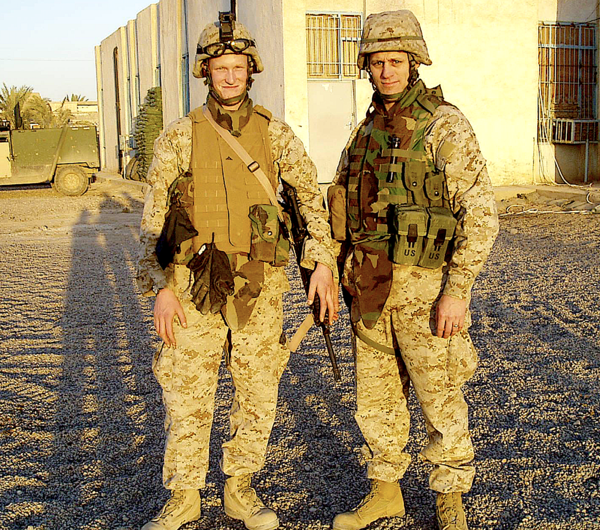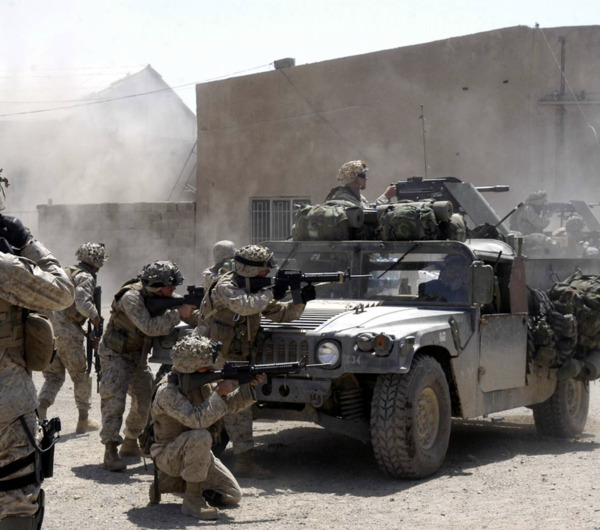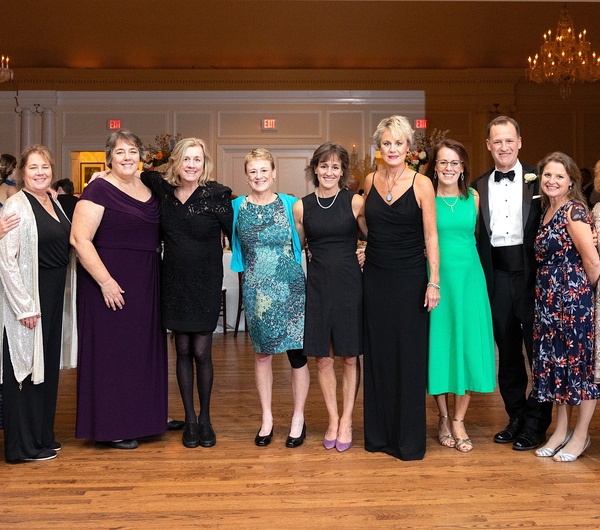
PROSPECT HEIGHTS — For John Williams, then a Marine serving in Iraq, the 2004 Easter Triduum bore no spiritual revival — or so he thought. On Holy Thursday of that year (April 8), his unit got orders to join Operation Vigilant Resolve, also known as the First Battle of Fallujah. One of his tasks as an administrative clerk for the 3rd Battalion, 4th Marines of the 1st Marine Division was accurately recording casualties — information vital for the solemn duty of notifying the families of fallen service members.
When Easter Sunday dawned on April 11, Williams’ battalion was in fierce house-to-house fighting. Casualty reports flowed into headquarters. Among the names was an officer Williams knew and worked with — 1st Lt. Oscar Jimenez, who was married with three children.
“I was raised a devout Catholic whose faith was never challenged in a real, substantive way,” Williams recalled. “I took it for granted that Christ died for our sins and rose from the dead, but to know Marines who were giving their lives so that others might live on the very day that we celebrate crisis and sacrifice — it made a profound impression, and it has grown on me.”
Williams was a corporal when he left the Marine Corps in 2007. Now, he is Deacon John Williams at the Pope St. John XXIII Seminary in Weston, Massachusetts. His ordination to the priesthood is set for June. Deacon Williams shared his written account of Easter 2004 with Father Christopher Heanue, rector of the Co-Cathedral of St. Joseph in Prospect Heights, Brooklyn, who suggested he share it with The Tablet. Father Heanue is also an adjunct professor at the seminary, teaching parish governance.
Deacon Williams is from Annandale, Virginia. He is the youngest of 15 children — 12 girls and three boys — raised by Dr. Harvey Williams, a general practitioner, and his wife, Anne. After high school, he majored in history at the College of William & Mary in Williamsburg, Virginia.
“It’s a good school, but I was restless,” he wrote. “I was not happy. The 9/11 attacks and a desire to serve my country were the two main reasons that I withdrew my junior year.” Deacon Williams chose the Marines partly because his brother Harvey — the family’s eldest child — served with them as a logistics officer in the 1980s. He was recalled to service after the terrorist attacks on Sept. 11, 2001.

The other reason, he wrote, was that the Marines are “brilliant at recruiting.”
“They say, ‘We’re the best. Come join us if you can,’ ” Deacon Williams explained. “That cockiness and bravado is attractive to young men. It appeals to the desire for adventure and to do something in a cause greater than yourself.” Deacon Williams’ cause was issued to him — the Second Gulf War, linked to the broader global war on terror.
The First Battle of Fallujah was a response to the March 31, 2004, ambush of four military contractors employed by the firm Blackwater. They were pulled from their vehicle, executed, set ablaze, and hung from a bridge. The future deacon went to Fallujah with full combat gear, as is standard practice.
Deacon Williams is quick to note, however, that his duties overseas didn’t involve regular trigger squeezing. Still, he occasionally augmented foot patrols and spent many a lonely night on guard watch.
On Easter Sunday, April 11, 2004, he joined an escort force for a supply convoy that was ambushed moving into Fallujah. The commander of the convoy was Jimenez, who was mortally wounded. Deacon Williams subsequently reported the lieutenant’s name to the chain of command.
Two more would join that list: Lance Corp. Torrey Gray and Corp. Daniel Amaya.
“I did not experience the joy of the resurrection that Easter,” Deacon Williams wrote in the article shared with Father Heanue. “I was still in the tomb.”

By the summer of 2004, the battalion was back at its base at Twentynine Palms, California. To boost security for Iraq’s national elections in January 2005, a return deployment to Fallujah was fast-tracked.
Deacon Williams was still in Iraq for Easter 2005, but this time, the fighting ebbed long enough for him to attend Sunday Mass. He was surprised to see a familiar face: his older brother, Lt. Col. Harvey Williams.
Deacon Williams wrote that it was a joyful moment — “brothers in arms and brothers by blood” — beholding the presence of their resurrected savior in a place where just a year before saw only death.
During nighttime guard duty, Deacon Williams had time to think, and he began to consider the priesthood. First, however, he completed his college education plus a decade teaching religious studies at Jesuit high schools in Maryland and Indiana.
When the pandemic froze human activity, including in-person classrooms, Deacon Williams again had time to consider his future and what God wanted him to do with it. Now, at age 42, he is wrapping up work at the seminary in Weston, which specializes in vocations for men over 30.
After his priestly ordination, he will join the Diocese of Springfield, Massachusetts. There, like a good Marine, he will be ready for any assignment.
Deacon Williams wrote that he now knows that the turmoil of Easter 2004 set the stage for the renewal of Easter 2005 and his path to the priesthood.
“The terrible Triduum of the first Easter in Fallujah made the joy of the next year possible,” Deacon Williams wrote. “The hours of lonely watch in the desert night were but a prelude to dawn.”

God bless Deacon Williams. I hope he considers becoming a military chaplain – our service members need them!